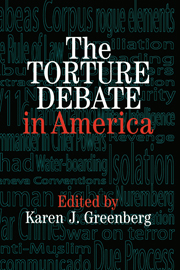Book contents
- Frontmatter
- Contents
- Acknowledgments
- List of Contributors
- Introduction: The Rule of Law Finds Its Golem: Judicial Torture Then and Now
- THE ISSUES
- ESSAYS
- Section One: Democracy, Terror and Torture
- Section Two: On the Matter of Failed States, The Geneva Conventions, and International Law
- Section Three: On Torture
- 13 Legal Ethics and Other Perspectives
- 14 Legal Ethics: A Debate
- 15 The Lawyers Know Sin: Complicity in Torture
- 16 Renouncing Torture
- 17 Reconciling Torture with Democracy
- 18 Great Nations and Torture
- Section Four: Looking Forward
- RELEVANT DOCUMENTS
- AFTERTHOUGHT
- Index
13 - Legal Ethics and Other Perspectives
Published online by Cambridge University Press: 05 August 2012
- Frontmatter
- Contents
- Acknowledgments
- List of Contributors
- Introduction: The Rule of Law Finds Its Golem: Judicial Torture Then and Now
- THE ISSUES
- ESSAYS
- Section One: Democracy, Terror and Torture
- Section Two: On the Matter of Failed States, The Geneva Conventions, and International Law
- Section Three: On Torture
- 13 Legal Ethics and Other Perspectives
- 14 Legal Ethics: A Debate
- 15 The Lawyers Know Sin: Complicity in Torture
- 16 Renouncing Torture
- 17 Reconciling Torture with Democracy
- 18 Great Nations and Torture
- Section Four: Looking Forward
- RELEVANT DOCUMENTS
- AFTERTHOUGHT
- Index
Summary
I SERVED IN THE JUSTICE DEPARTMENT'S OFFICE OF LEGAL COUNSEL, OR OLC, from 1991 to 1994. I read with interest, therefore, OLC's draft memorandum of January 9, 2002, on whether the protections of the Geneva Convention apply to al Qaeda and Taliban detainees. It was brought to my attention by Stephen Gillers' opinion column last year in The American Lawyer, criticizing the legal ethics of the OLC lawyers who prepared the memorandum. His essay in this volume reiterates and amplifies the criticism. I believe that Professor Gillers' position is demonstrably ill-informed and without merit. In the discussion below, I will present the factual background necessary to fairly judge OLC's work on Geneva. Then, I will explain where I think Professor Gillers errs.
THE PRESIDENT'S DETERMINATION
It is the President's determination with regard to Geneva that is at issue. On February 7, 2002, the President issued a memorandum of determination addressed to the Vice President, Secretary of State, Secretary of Defense, Attorney General, Chief of Staff to the President, Director of Central Intelligence, Assistant to the President for National Security Affairs, and the Chairman of the Joint Chiefs of Staff.
His memorandum begins: “Our recent extensive discussions regarding the status of al Qaeda and Taliban detainees confirm that the application of the Geneva Conventions … to the conflict with the al Qaeda and the Taliban involves complex legal questions.”
- Type
- Chapter
- Information
- The Torture Debate in America , pp. 229 - 235Publisher: Cambridge University PressPrint publication year: 2005



